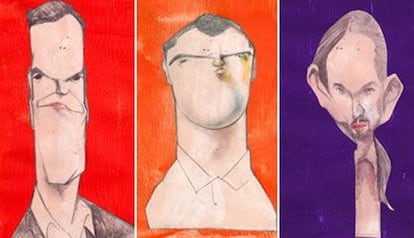“Without proper debate there can be no democracy”
Candidates taking part in Monday’s EL PAÍS debate agree head-to-heads are “good politics”


Spain has held five election debates between prime ministerial candidates since the return to democracy in the 1970s.
A debate is not just between the rivals, it is a debate with the nation, with voters” Ciudadanos leader Albert Rivera
The practice only has a short tradition in the country compared to places such as the United States, where the presidential candidates will arrive at next year’s elections having taken part in around 10 debates each.
The head-to-head that EL PAÍS will host on November 30 will thus be the sixth such encounter in Spanish democratic history. However, the event will feature one notable absence: Prime Minister Mariano Rajoy, of the Popular Party (PP), who has only committed to taking part in one debate in the entire campaign for the December 20 general election.
Details of the debate
The debate starts at 9pm and ends at 10.30pm on November 30
Special coverage by EL PAÍS will begin at 8pm with political analysis
Following the debate, this newspaper's online coverage will include further analysis of the candidates' performance by political reporters and outside commentators
EL PAÍS users may vote for the candidate they consider to be the winner of the debate, and the results will be released
The debate is structured around four areas: economy and employment; social policies and the welfare state; territorial affairs; and political reform and regeneration.
Each candidate will have two minutes to present proposals in each area, then spend the next nine minutes asking questions of one another.
For five minutes they will also take questions from the audience. This is the first time that people outside the candidates' campaign teams are allowed to such a debate. Around 100 EL PAÍS readers will sit inside the studio and ask questions pulled from social media.
Each candidate will then have one last minute to look at the camera and convince viewers to vote for them on December 20.
The English Edition of EL PAÍS will be live-blogging the debate in English for its readers.
Those candidates who are participating – Socialist Party leader Pedro Sánchez, Ciudadanos’ Albert Rivera and Podemos chief Pablo Iglesias – uphold debates as elements that revitalize democracy.
“To regenerate democratic life you have to debate, you have to deliberate,” says Sánchez, who, like the other two participants, is scheduled to take part in three debates in the run-up to the December 20 vote.
“When you differentiate artificially between new and old politics, what you have to support is good politics, which is the politics of debate,” he says.
“A debate is not just between the rivals, it is a debate with the nation, with voters,” says Rivera.
“Without proper debate there can be no democracy,” adds Iglesias.
The only one of the top candidates to disagree is the prime minister. Rajoy made it known during an interview with the Cope radio network on Wednesday – where he had gone to commentate on a Real Madrid Champions League match – that too many debates are a waste of his valuable time.
“I have taken part in many debates over the course of my life, but, of course, I cannot be debating the whole time because I need to carry on working as prime minister and do many things,” he said.
Nevertheless, the PP leader is due to be interviewed by private TV network Telecinco on the same day and at the same time as the EL PAÍS debate, which will be the first major encounter between the main candidates.
Rajoy’s absence from the many head-to-heads in this election campaign continues to draw criticism.
Andalusian regional premier Susana Díaz, of the Socialist Party, said on Thursday that it was “outrageous” that the prime minister had decided not to attend the debates and “send his number two and, what’s more, go on commentating on […] Ronaldo’s goals.” Deputy Prime Minister Soraya Sáenz de Santamaría is due to replace Rajoy in the TV debate organized by the Atresmedia media group on December 7.
I cannot be debating the whole time because I need to carry on working as prime minister” Popular Party leader Mariano Rajoy
The PP has defended its leader by saying that the “important thing” is that the prime minister “is showing his face,” in reference to the fact that he is taking part in various TV programs.
The first television debate after the transition to democracy took place in 1993, between then-Socialist Prime Minister Felipe González and Popular Party candidate José María Aznar. For the second, Spaniards had to wait another 15 years. The political changes now sweeping the country seem to have changed another Spanish tradition.
English version by Nick Funnell.
Tu suscripción se está usando en otro dispositivo
¿Quieres añadir otro usuario a tu suscripción?
Si continúas leyendo en este dispositivo, no se podrá leer en el otro.
FlechaTu suscripción se está usando en otro dispositivo y solo puedes acceder a EL PAÍS desde un dispositivo a la vez.
Si quieres compartir tu cuenta, cambia tu suscripción a la modalidad Premium, así podrás añadir otro usuario. Cada uno accederá con su propia cuenta de email, lo que os permitirá personalizar vuestra experiencia en EL PAÍS.
En el caso de no saber quién está usando tu cuenta, te recomendamos cambiar tu contraseña aquí.
Si decides continuar compartiendo tu cuenta, este mensaje se mostrará en tu dispositivo y en el de la otra persona que está usando tu cuenta de forma indefinida, afectando a tu experiencia de lectura. Puedes consultar aquí los términos y condiciones de la suscripción digital.








































